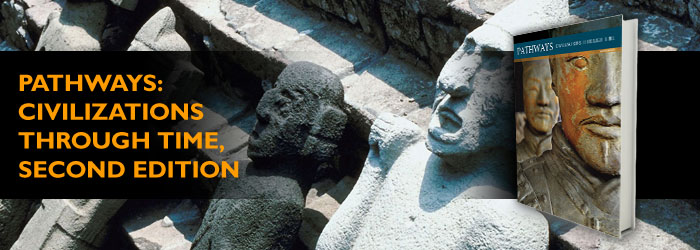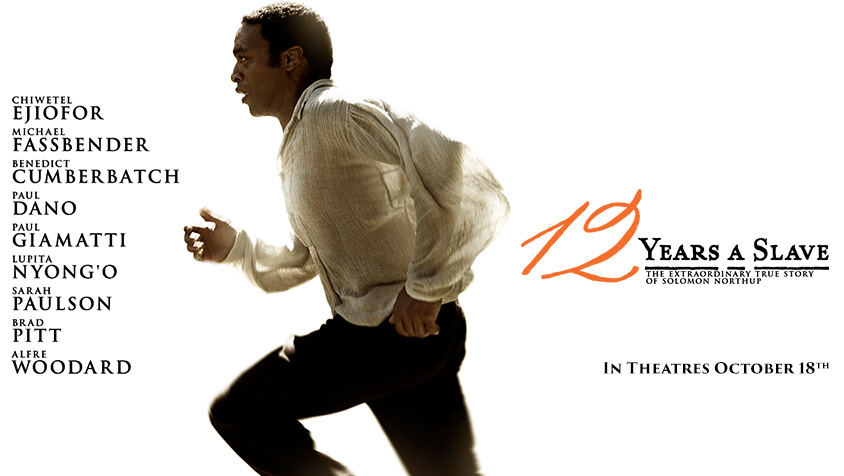
I recently sat down with the new edition of Pathways: Civilizations Through Time, a Social Studies textbook used in grade 8 classes in Canada. As I read the foundational materials in the beginning section, I found myself in conversation with the text. This is that conversation:
Me: I wanted to talk to you a little about the section called “Religion and Civilizations.” It must be a little dicey to talk about religion in a way that is acceptable for use in schools. I mean, there’s going to be a wide range of religious beliefs in the classrooms where you are read. You are supposed to remain neutral on this sort of thing. How do you frame religion in relation to your overall topic, civilizations?
Pathways: “Religion is an important aspect of civilization. In many civilizations, both in the past and in the present, religious beliefs are one way a civilization defines and describes itself. Religion also influences people’s values and actions.”
Me: So it’s important for us to learn about religions.
Pathways: “Learning about different religions allows us to understand the civilizations to which these religions belonged.”
Me: That shouldn’t upset too many people, but as a religious person myself, I must admit that I’m a little leery about the idea of looking at religion just to understand a civilization. I mean religion is pretty important to people. But I guess you’re limited in how much you can say about religion and still maintain your neutrality. Tell me, what is your view on why we have religions in the first place?
Pathways: “Human beings have always asked what we call ‘big questions.’ You have probably asked them, too.”
Me: What do you mean by “big questions”?
Pathways: What happens to me after I die? What is the difference between right and wrong? Why am I here? Why do bad things happen? How was all this created?
Me: Wow, those are big questions. They are important questions too, we should be answering them.
Pathways: “Human beings like to have answers to their questions.
Me: They “like” to have answers to their questions? Maybe if the question is “When’s dinner?” Aren’t these questions a little weightier than that? Wouldn’t it be accurate to say that human beings need to answer these questions? I mean, the answers will change everything. How can we not answer them? Don’t you think that these questions and the answers to them are hugely important? It seems like they might be the most important questions we can ask?
Pathways: Having answers make us feel more secure.
Me: That’s it? Security? You realize people aren’t wrestling with the big questions because they are on a quest for security, right. It’s a search for meaning and purpose. Any security, if it’s gained at all, is just a by-product of the search for big answers to the big questions. How do you answer the big questions?
Pathways: “[T]hese big questions cannot be answered the same way ordinary questions can be.”
Me: Ordinary questions? What do you mean by “ordinary”?
Pathways: “For example, science tells us that water is made up of hydrogen and oxygen. This is based upon creating a hypothesis and then using experiments to discover if our original ideas were correct.
Me: So by ordinary, you mean questions that result in answers that you can prove using the scientific method. You are right. The answers to the big questions can’t be proven like H20 questions.
Pathways: With religion, people have to accept answers that are based on non-scientific evidence. “
Me: Yes, they do. But that’s not really a problem with the questions, is it? The problem is with the method. Your scientific evidence is limited—it’s limited to physical things, and event that happen in the realm of physical things. Religions are looking for answers that go beyond material. You can’t get very far studying the stars with a dissection tray and a microscope. These are the wrong tools. Science is the wrong tool to determine the meaning of life. Or do you think that science is the only legitimate tool in the search for any truth? All truth?
. . . Where were we? Oh yes, you said that ordinary questions are the ones for which the answers are based on science, and the answers to big questions are non-scientific. Are you implying that the answers to big questions are not as good as ordinary ones? Like they are sorta just made up?
Pathways: “In effect, [people] have to accept them based on their beliefs (faith).”
Me: Well, that’s not entirely true, it is? Even though the answers might be non-scientific, that doesn’t mean they are non-rational. Sure, there is an element of faith, but there is also a significant element of reason involved in religion. I mean it’s reasonable to conclude that there is a god, or gods, behind the creation of the universe. Just like it’s reasonable to conclude that there isn’t.
But there’s another thing about your word choice: I noticed you consistently use the term “us” when speaking of knowing scientifically and the word “people” when speaking about believing? I thought it was interesting how you distance yourself, and, consequently, your young readers from the act believing.
I’m beginning to be a little suspect of your neutrality.
But let’s move on. Why do we have so many different religions?
Pathways: “Different Faiths, Different Answers”
Me: Could you elaborate?
Pathways: “There are many religions in the world, and each one has different answers to the big questions.”
Me: Which one is right?
Pathways: “Which one is right? No one religion has the ‘right’ answers, because the big questions have no scientifically provable answers.”
Me: Did I hear you right? You didn’t say that “You can’t know who is right”; you said “you can’t be right if the answers aren’t scientifically provable. That doesn’t make any sense—it’s not logical. If there is a right answer, but it can’t be proven to be right, isn’t it right anyway?
. . . All religions answer the questions differently, so on one question some religion must be closer than others—that’s logical, isn’t it? If one religion teaches you love your enemies and another teaches eat your enemies, they can’t both be equally true. They say opposite things. The only way they can be equal true, is if they are equally false.
. . . I think I understand your problem. You actually believe that something isn’t true unless it is proven scientifically, but you can only believe that if you believethat reality is only physical things and physical events.Are you saying that reality is nothing but physical or material?
Be careful. However you answer, you will be making a scientifically unprovable claim in response to a big question.
That’s OK, you don’t have to answer. You already did anyway. You’re as bad as religious people.
You realize that you are not nearly as neutral as you think. Whether we like it or not, we all answer big questions.
My concern is for the students who might read this section, especially those who don’t have teachers who can guide them through your non-scientific beliefs. What do you say to a grade 8 student who is thinking about the big questions? You aren’t really going to be allowed to discourage participation in religion.
Pathways: In Canada today, there are many different religions. If you were looking for a religion to belong to, you could find out what different religions say about the big questions. Then you could choose the religion with the answers you are most comfortable with, or that fit best with what you already think.
Me: At least you are consistent. Since they are all equally false, it doesn’t matter what religion you pick, or the criteria by which you pick it. I understand that you think you are being equally fair to all religions, but you actually being equally unfair.
People are looking for truth and meaning, and they believe they can find it. So, we can’t just shop for a religion like we do for shoes and pick the pair that fits. If truth and meaning exist, we will conform to it, not it to us.
How do you suggest we deal with people who have a different religion?
Pathways: “Even if you had a different religion than your friends, that probably would not matter too much. If fact, you could probably learn something from each other.”
Me: I thought you would say that. It’s fine to have a religious belief but don’t take it too seriously. I suppose that’s your picture of religious tolerance.
I think that the only way to have true tolerance is to take each other’s beliefs very seriously—even yours. Wouldn’t the picture of tolerance be a materialist, such as yourself, talking with a Christian and a Muslim over a good cup of coffee. And listening. And disagreeing, but enjoying the company, the conversation, and the coffee all the while respecting the sincerity of each other’s beliefs? Wouldn’t this be a better picture to present to grade 8 students?
For that to happen, you’d have to step down from your position as final arbiter of truth and admit that your just like the rest of us. Trying to understand the world around you. Having faith in the idea that there isn’t something up there.
Unless we all take this posture, nobody is going to learn anything from anybody.





